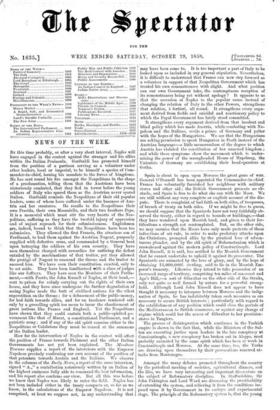NEWS OF THE WEEK.
BY this time probably, or after a very short interval, Naples will have engaged in the contest against the stranger and his allies
within the Italian Peninsula. Garibaldi has promoted himself from the position of a partisan serving as a volunteer under other leaders, local or imperial, to be himself a species of Com- mander-in-chief, issuing his mandate to the forces of kingdoms.
He has sent round his fire amongst the Neapolitans in the shape of a proclamation, telling them that the Austrians have been victoriously combated, that they fled in terror before the young soldiers of Italy who spared them as the Austrian never spared Italian. Garibaldi reminds the Neapolitans of their old popular leaders, some of whom have suffered under the baseness of Aus- tria and her creatures. He recalls to the Neapolitans their own Procida, their own Masaniello, and their two brothers Pepe. It is a memorial which must stir the very hearts of the Nea- politans, suffering as they have the twofold injury of oppression and of unjust reproach for their submissiveness. Englishmen ,are, indeed, bound to think that the Neapolitans have been too submissive. They allowed the first Francis, the atrocious son of Ferdinand, to lead them against the Austrian Nugent, purposely supplied with defective arms, and commanded by a General bent upon betraying the soldiers of his own country. They have seen themselves charged with cowardice for suffering the defeat entailed by the machinations of that traitor, yet they allowed the protege of Nugent to reascend the throne and the traitor to succeed him. We have seen their constitution enacted, only to be set aside. They have been familiarized with a class of judges like our Jeffreys. They have seen the Members of their Parlia- ment,—with. Poetic), the John Russell of Naples, at their head,— sent to prison for calmly carrying out the rights of their own house, and they have since undergone the farther degradation of seeing Naples made the butt of civilized nations for the vilest _superstition on the throne ; for a debasement of the public money, for bad faith towards allies, and for an insolence rendered safe only by a grovelling spirit too mean to incur the chastisement of great nations like France and England. Yet the Neapolitans have shown that they could sustain both a public-spirited go- vernment like that of Murat, a constitutional Parliament, and a patriotic army; and if any of the old spirit remains either in the Neapolitans or Calabrians they must be roused at the summons of the Italian leader.
Row far the intervention of Naples in the contest will affect the position of France towards Piedmont and the other Italian Governments has not yet been explained. The Monitore Toscano supplies a report of the interviews with the Emperor Napoleon precisely confirming our own account of the position of that potentate towards Austria and the Italians. We observe in the columns of the Daily News, a report of the same interview, signed " A.," a contribution notoriously written by an Italian of the highest eminence fully able to command the best information, and his report also confirms our view. But all this was before we knew that Naples was likely to enter the field. Naples has not been included either in the treaty compacts or, so far as we know, in the calculations of the Emperor Napoleon. It is not comprised, at least we suppose not, in any understanding that may have been come to. It is too important a part of Italy to be looked upon as included in any general stipulation. Nevertheless, it is difficult to understand that France can now step forward as a volunteer in support of that Neapolitan Government which has treated his own remonstrances with slight. And what position can our own Government take, the contemptuous reception of its remonstrances being yet without apology ? It appears to us that the accession of Naples to the popular cause instead of changing the relation of Italy to the other Powers, strengthens that relation, a fortiori, all round. It strengthens every argu- ment derived from feeble and suicidal and reactionary policy to which the Papal Government has lately stood committed.
It strengthens every argument derived from that insolent and blind policy which has made Austria, while combating with Na- poleon and the Italians, revile a prince of Germany and palter with the hopes of the Hungarians. We see that the Hungarians are asking permission to speak Hungarian in Pesth instead of the Austrian language—a little memorandum of the degree to which Austria has violated the constitution of her annexed kingdom ; and while these symptoms show the movement which is under- mining the power of the wrongheaded House of Hapsburg, the Unionists of Germany are establishing their head-quarters at Gotha.


























